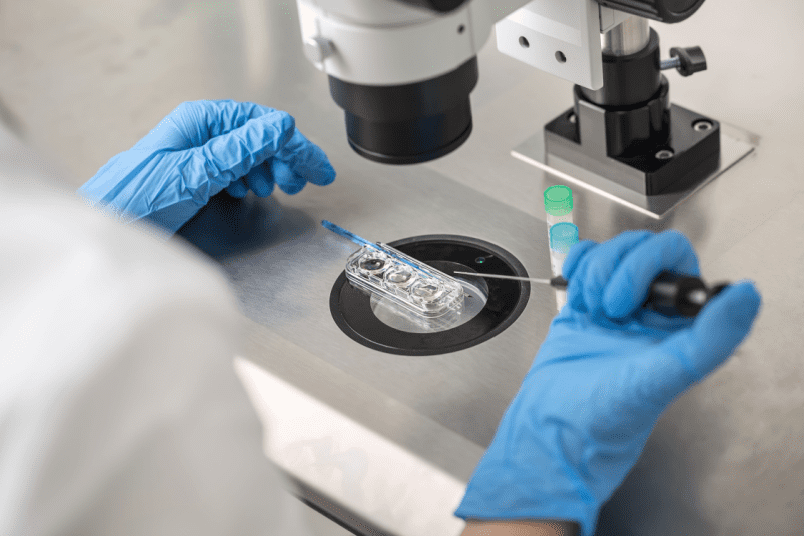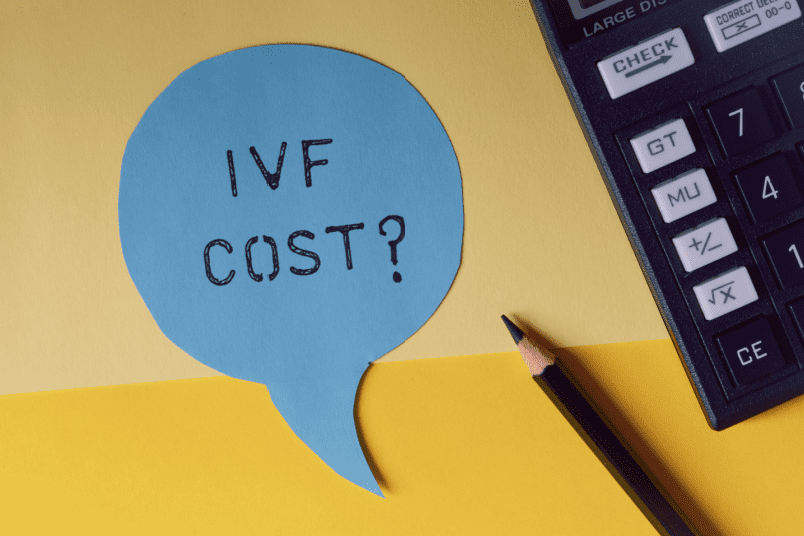In vitro fertilization (IVF) is a procedure in which an egg and sperm are combined outside the body in a laboratory dish. The fertilized egg (embryo) is then transferred into the uterus to establish a pregnancy. IVF is often used when other fertility treatments have failed, and it can assist couples with various reproductive challenges. IVF has helped many individuals and couples overcome infertility, offering a pathway to parenthood by facilitating conception through advanced reproductive technology (ART).
Why is IVF performed?

IVF is performed to achieve a successful and healthy pregnancy for individuals facing fertility challenges. It is used to treat many infertility issues, including:
Infertility Diagnosis: Couples or individuals diagnosed with infertility after attempting natural conception for an extended period, may opt IVF.
Fallopian Tube Issues: Women with blocked or damaged fallopian tubes, hindering natural conception, may consider IVF.
Ovulatory Disorders: Conditions affecting regular ovulation, such as polycystic ovary syndrome (PCOS), may undergo IVF.
Male Infertility: Couples facing male infertility issues, such as low sperm count or motility, may choose IVF.
Endometriosis: Women with endometriosis, a condition where tissue grows outside the uterus, may opt for IVF due to fertility challenges.
Unexplained Infertility: When the cause of infertility remains unclear after thorough evaluation, IVF may be recommended.
Genetic Disorders: Couples with a risk of passing on genetic disorders may choose IVF with preimplantation genetic testing (PGT) to select healthy embryos.
Age-related Fertility Decline: Advanced maternal age can impact fertility, and IVF becomes an option for older women trying to conceive.
Previous Unsuccessful Treatments: After failed attempts with other fertility treatments, couples may turn to IVF for a higher chance of success.
What are the steps involved in IVF?

The following are the various steps involved in IVF:
Ovarian Stimulation: Fertility medications are administered to stimulate the ovaries, promoting the development of multiple eggs. Hormone levels and follicle growth are closely monitored through blood tests and ultrasounds.
Egg Retrieval (Oocyte Retrieval): Eggs are retrieved from the ovaries using a thin needle, guided by ultrasound. This is a minor procedure performed under anesthesia.
Fertilization in the Laboratory: Sperm sample is collected. In a controlled laboratory environment, eggs and sperm are combined in a culture dish to facilitate fertilization.
Embryo Culture: Fertilized eggs (embryos) are monitored for development in an incubator. Embryos typically reach a suitable stage for transfer within 3-5 days.
Embryo Transfer: One or more embryos are selected and transferred into the woman’s uterus carefully. This is a relatively simple, outpatient procedure, often performed without anesthesia.
Pregnancy Test: Two weeks after a successful embryo transfer, a blood test is performed to determine if the IVF cycle has resulted in pregnancy.
How to prepare for IVF?

Preparation for IVF involves various steps including:
Medical Evaluation: Comprehensive fertility assessments for both partners, including hormonal tests, semen analysis, and imaging studies are required to identify the reason behind infertility.
Lifestyle Modifications: Adopting a healthy lifestyle, including a balanced diet, regular exercise, and avoiding harmful habits like smoking and excessive alcohol consumption.
Ovarian Stimulation Protocol: Discussing and understanding the ovarian stimulation protocol, which involves medications to promote multiple egg development.
Emotional and Psychological Support: It is essential to consider emotional support if needed, as fertility treatments can be challenging at times.
Financial Planning: Understanding the cost implications, potential insurance coverage, and exploring available financial options are also important before undergoing IVF.
Preimplantation Genetic Testing (PGT): If PGT is planned, discussions regarding the testing process and its implications on embryo selection are vital.
Preparing for Egg Retrieval and Transfer: Understanding the procedures involved in egg retrieval and embryo transfer, and planning for any necessary time off work will help the patient to prepare for this procedure.
Support System: Building a strong support system with family, friends, or support groups to navigate the emotional aspects of the IVF journey is needed.
What is the cost of IVF?

The cost of in vitro fertilization (IVF) in India varies. Factors influencing the cost include the clinic’s reputation, location, the expertise of medical professionals, and the specific treatments required. Additional expenses may include medications, diagnostic tests, and consultation fees. Some clinics may offer package deals, which can impact the overall cost. It is important to consider these factors and discuss the detailed breakdown of expenses with the chosen fertility clinic. Government initiatives and insurance coverage may also influence the financial aspects of undergoing IVF treatment in India.
To conclude, IVF plays a crucial role in achieving pregnancy for couples facing fertility challenges. It offers hope to those with infertility issues, increasing the chances of conception. While costs vary in different locations in India, the emotional and familial benefits of a successful IVF journey are often deemed priceless by those seeking to build a family.
NU Fertility @NU Hospitals in Bangalore, India provides a comprehensive approach to IVF, addressing physical, emotional, and psychological aspects. Their holistic methodology encompasses advanced medical techniques, personalized treatment plans, and supportive counselling. With a focus on patient well-being, NU Fertility aims to enhance the overall fertility experience. The hospital’s commitment to excellence extends in creating a nurturing environment, ensuring couples receive comprehensive care throughout their IVF journey in Bangalore.
References:
- In Vitro Fertilization. Medline Plus.
https://medlineplus.gov/ency/article/007279.
- In Vitro Fertilization. Mayo Clinic.
https://www.mayoclinic.org/testsprocedures/invitrofertilization/about/pac20384716.
- What is IVF? Planned Parenthood.
https://www.plannedparenthood.org/learn/pregnancy/fertilitytreatments/whativf.
- All about IVF. Pregnancy birth& baby.
https://www.pregnancybirthbaby.org.au/ivf.
Author: Dr. Sneha J



